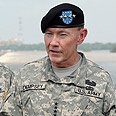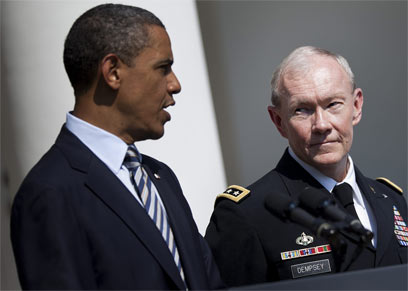
Top US general: Military options achievable
Chairman of the Joint Chiefs of Staff Martin Dempsey warns Iranian regime against 'miscalculating our resolve.' Any miscalculation, he says, 'could mean that we are drawn into conflict, which would be a tragedy for the region and the world'
"I am satisfied that the options that we are developing are evolving to a point that they would be executable if necessary," Dempsey said during a visit to Afghanistan, adding that there was no guarantee Israel would give the United States warning if it decided to attack Iran.
Related stories:
- Iran admits oil output hit by sanctions
- Iranian blogger slams 'spy' confessions Dagan: Threat of attack may hasten Iran nuke program
"We are trying to establish some confidence on the part of the Israelis that we recognize their concerns and are collaborating with them on addressing them," said the top general.

Dempsey has been touring the globe in the past few days, CNN reported. From Iraq to Afghanistan, Kuwait to Saudi Arabia, the chairman of the Joint Chiefs of Staff heard about growing concerns over Iran's ambitions.
"My biggest worry is they will miscalculate our resolve," he said. "Any miscalculation could mean that we are drawn into conflict, and that would be a tragedy for the region and the world."
Gathering intelligence
Washington suffered a heavy blow in its secret war against Tehran with the recent loss of a US spy drone over Iran. Asked about the issue, Dempsey told CNN that the loss of the drone was not the end of American efforts to figure out what Iran was doing.
"If you are asking, 'Are we gathering intelligence against Iran in a variety of means?' the answer is of course," he said. "It would be rather imprudent of us not to try to understand what a nation who has declared itself to be an adversary of the United States is doing."
Behind the scenes, CNN said, Dempsey is quietly leading the ongoing military planning for an attack against Iran's nuclear weapons in the event the president gives the order to do so.
"We are examining a range of options," he said, echoing the "all options on the table" line used by administration officials.
Dempsey's comments come on the backdrop of Secretary of Defense Leon Panetta's declaration that the US believes Iran is capable of developing a nuclear weapon within a year's time, if it chooses to do so.
Panetta guaranteed that this was a "red line" for the US, which would take any possible step to prevent it.
According to CNN, the Pentagon is pushing back against suggestions that Panetta has speeded up the US prediction of when Iran could have a nuclear weapon.
"Nothing has changed about the views he has expressed - repeatedly - of the concerns about where Iran is headed and about the approach the United States and the international community need to continue to take," Pentagon spokesman Captain John Kirby said Tuesday.
"I think what he meant in general was they could have the nuclear weapons capability in a year, I think was how he captured that," Kirby said. "We all recognize that is a difficult process - could be that fast, might not be that fast."
- Follow Ynetnews on Facebook and Twitter
- Receive Ynetnews updates directly to your desktop










